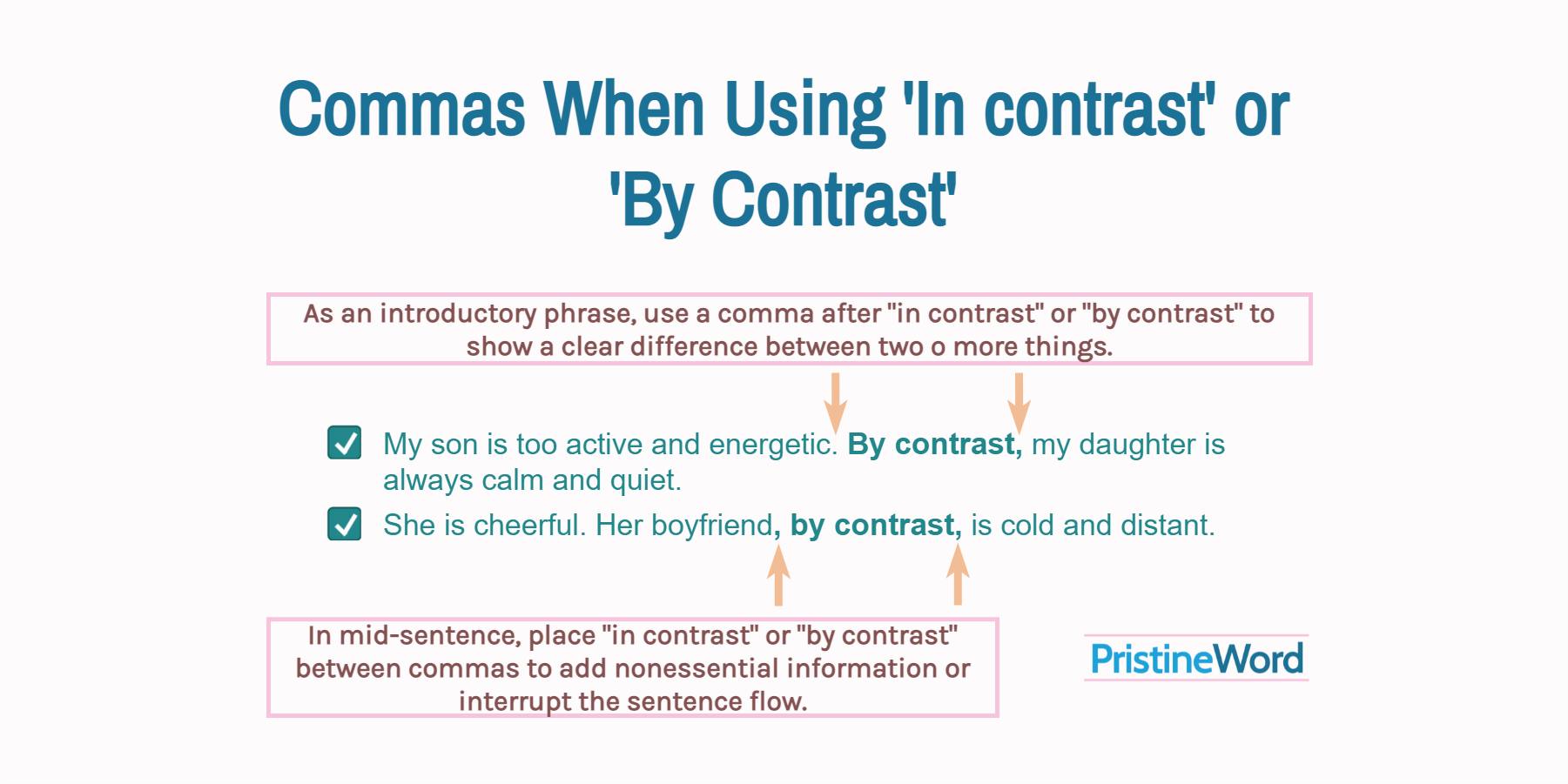As an introductory phrase, use a comma after "in contrast" or "by contrast" to show a clear difference between two o more things.
As an introductory phrase, use a comma after "in contrast" or "by contrast" to describe a clear difference between two or more things.
Young people are generally energetic. By contrast, older adults tend to be less physically active.
In mid-sentence, place "in contrast" or "by contrast" between commas to add nonessential information or interrupt the sentence flow.
She is cheerful. Her boyfriend, by contrast, is cold and distant.
Contents
1. Difference Between In Contrast and By Contrast
"In contrast" and "by contrast" mean the same thing. Both are used to illustrate a sharp contrast between two alternatives or situations; however, there is a slight difference in the way we use them.
"By contrast" is commonly preceded or followed by the subject of the sentence.
Generally, liberals believe in government intervention. Conservatives, by contrast, believe in personal responsibility and limited government.
My son is too active and energetic. By contrast, my daughter is always calm and quiet.
"In contrast" is frequently followed by "to" or "with" and requires a noun after it.
In contrast to his popularity a few years ago, he is now being criticized for his inconsistent opinions.
2. When to Use Commas with 'In Contrast' or 'By Contrast'
Use a comma after "by contrast" at the beginning of a sentence to show an entirely different situation, perspective, or opinion.
Asian countries are experiencing a rapid growth. By contrast, European countries are struggling.
Asian countries are experiencing a rapid growth. By contrast European countries are struggling.
Use a comma after an introductory phrase starting with "in contrast to..." or "in contrast with".
In contrast to other American states, the death rate in Kansas is falling.
In contrast with other conventional methodologies, E-learning is here to stay.
Use commas to set off the interrupting phrase "by contrast" or "in contrast..." in mid-sentence when adding information that can be safely removed without changing the meaning of the sentence.
I love visiting warm countries. My husband, by contrast, prefers cold destinations.
I love visiting warm wountries. My husband by contrast prefers cold destinations.
Rationalism is the belief in innate ideas and deduction. Empiricism, by contrast, believes in sense perception and induction.
When using longer interrupting phrases, enclose the whole phrase in commas.
Ashley, in contrast to her previous success in high school, is now struggling as a college student.
Note that we can safely omit the interrupting phrase ("in contrast to her previous success in high school" in the example above) without changing the meaning of the sentence.
Ashley is struggling as a college student.
Do not forget to add the closing comma (also known as an appositive comma) when inserting an interrupting expression or phrase in mid-sentence.
I think that we should invest in real estate. My husband, by contrast, wants to invest in stocks.
I think that we should invest in real estate. My husband, by contrast wants to invest in stocks.
In many situations, you can use parentheses or em dashes instead of commas.
My elder son (in contrast with the younger) loves playing basketball.
Recommended: Commas before and after a conjunctive adverb
3. When Not to Use Commas
Do not use commas if "by contrast" or "in contrast to/with..." introduces restrictive or important information, necessary to understand the complete meaning of a sentence.
This was in contrast to the success he enjoyed last year.
But add a comma after "by contrast" or "in contrast to/with..." to introduce the main part of a sentence.
In contrast with last year's profits, the company suffered a huge $5.7 million loss in January due to low demand and rising oil prices.
When using "in contrast" or "by contrast" at the end of a sentence, we do not generally use commas before it.
Mary is extremely hard-working, which made her boyfriend look lazy by contrast.

